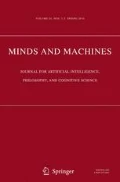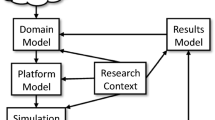Abstract
The epistemology of computer simulations has become a mainstream topic in the philosophy of technology. Within this large area, significant differences hold between the various types of models and simulation technologies. Agent-based and multi-agent systems simulations introduce a specific constraint on the types of agents and systems modelled. We argue that such difference is crucial and that simulation for the artificial sciences requires the formulation of its own specific epistemological principles. We present a minimally committed epistemology which relies on the methodological principles of the Philosophy of Information and requires weak assumptions on the usability of the simulation and the controllability of the model. We use these principles to provide a new definition of simulation for the context of interest.
Similar content being viewed by others
Notes
The literature on this topic is usually referred to as starting with Frigg and Reiss (2009).
For definitions of agents including these properties see for example Crooks and Heppenstall (2012, p. 87) and Macy and Willer (2002, p. 146). Note that it is possible to argue that the following characterization of agents presents at least some overlapping with the definition of agents in other contexts, e.g. in game-theoretical analyses, although the latter would typically have stronger constraints like perfect rationality. The arguments presented in the following of this contribution rely strongly on the methodological principles underlying the simulation processes in which these agents are involved, their behaviour analysed and conclusions drawn, rather than on whether the assumed properties of agents are exclusive of Agent-based modelling and MAS.
The validity of this analysis for the simulation of natural agents should be put under strict scrutiny and shall not be considered here.
See Humphreys (1990, pp. 499–500).
See Korb and Mascaro (2009, Section 6).
See Korb and Mascaro (2009, Section 4.2).
See Humphreys (2009, p. 625).
Exemplified in Grüne-Yanoff (2009).
See Epstein (2008, sec.1.10).
See e.g. Elsenbroich (2012).
See Elsenbroich (2012, sec.2.7).
For a concrete example, see e.g. https://evgenii.com/blog/earth-orbit-simulation/.
See Humphreys (2004, p. 109).
In Primiero et al. (2017) such a model is offerd where relations are characterised by positive and negative trust. Several topologies of networks are explored, where agents are ranked and have different epistemic attitudes, roughly corresponding to lazy agents (accepting information without control) and sceptic agents (accepting information under a computational cost corresponding to a verification process). Positive trust is a property of the communication between agents required when message passing is executed bottom-up in the hierarchy, or as a result of a sceptic agent checking information. Negative trust results from refusing verification, either of contradictory information or because of a lazy attitude.
For example, in Battistelli and Primiero (2017) this problem is treated in terms of a multi-agent temporal logic of weighted beliefs, with rules for distributed knowledge formation and conditional action.
I wish to thank an anonymous reviewer for this specific comment.
See Humphreys (1990, p. 500).
See Winsberg (2003, p. 111).
See Hartmann (1996, p. 83).
See Humphreys (2004, p. 110). With core simulation Humphreys refers to the temporal part of the computational process, which differentiates it from the underlying model consisting of atemporal logical or mathematical representations.
See Humphreys (1995, p. 507).
For example, in the multirobots system from Battistelli and Primiero (2017), the simulation allows to explore several possible configurations of reality that can be obtained, in order to choose the one that best resolves the intended task. Strictly speaking, the model is used to investigate the hypothesis [also known as Principle of Constructability in Floridi (2011)].
Cf. Korb and Mascaro (2009, p. 10).
See North and Macal (2007, pp. 30–31).
This is the view held in Korb and Mascaro (2009).
See Korb and Mascaro (2009, p. 9).
Also maintained in Winsberg (2003).
Cf. Railsback and Grimm (2011, p. 316).
See e.g. Korb and Mascaro (2009, p. 13).
Usability is to be considered weaker than reliability, which substitues truth in Winsberg (2006).
See e.g. Korb and Mascaro (2009, p. 11).
The characterization of experiments as exploratory in the artificial sciences and in robotics in particular is due to Schiaffonati (2016).
This position complements the semantic interpretation of simulations given in Barberousse et al. (2009) through the addition of the essential exploratory phase.
References
Barberousse, A., Franceschelli, S., & Imbert, C. (2009). Computer simulations as experiments. Synthese, 169(3), 557–574.
Battistelli, L., & Primiero, G. (2017). Logic-based collective decision making of binary properties in an autonomous multi-agent system. Technical report, Middlesex University London. https://doi.org/10.13140/RG.2.2.31902.18246
Crooks, A. T., & Heppenstall, A. J. (2012). Introduction to agent-based modelling. In A. J. Heppenstall, A. T. Crooks, L. M. See, & M. Batty (Eds.), Agent-Based Models of Geographical Systems (pp. 85–105). Dordrecht: Springer.
Durán, J. M. (2013). A brief overview of the philosophical study of computer simulations. American Philosophical Association Newsletter on Philosophy and Computers, 13(1), 38–46.
Elsenbroich, C. (2012). Explanation in agent-based modelling: Functions, causality or mechanisms? Journal of Artificial Societies and Social Simulation, 15(3), 1.
Epstein, J. M. (2008). Why model? Journal of Artificial Societies and Social Simulation, 11(4), 12.
Floridi, L. (2011). A defence of constructionism: Philosophy as conceptual engineering. Metaphilosophy, 42(3), 282–304.
Frigg, R., & Reiss, J. (2009). The philosophy of simulation: hot new issues or same old stew? Synthese, 169(3), 593–613.
Grüne-Yanoff, T. (2009). The explanatory potential of artificial societies. Synthese, 169(3), 539–555.
Guala, F. (2002). Models, simulations, and experiments. In L. Magnani & N. J. Nersessian (Eds.), Model-Based Reasoning. Boston, MA: Springer.
Hartmann, S. (1996). The world as a process. In R. Hegselmann, U. Mueller, & K. G. Troitzsch (Eds.), Modelling and simulation in the social sciences from the philosophy of science point of view (pp. 77–100). Dordrecht: Springer.
Humphreys, P. (1990). Computer simulations. In PSA: proceedings of the biennial meeting of the Philosophy of Science Association, 1990 (pp. 497–506).
Humphreys, P. (1995). Computational science and scientific method. Minds and Machines, 5(4), 499–512.
Humphreys, P. (2004). Extending ourselves: Computational science, empiricism, and scientific method. Oxford: Oxford University Press.
Humphreys, P. (2009). The philosophical novelty of computer simulation methods. Synthese, 169(3), 615–626.
Korb, K. B., & Mascaro, S. (2009). The philosophy of computer simulation. In Logic, methodology and philosophy of science: proceedings of the thirteenth international congress (pp 306–325). Springer.
Macy, M. W., & Willer, R. (2002). From factors to actors: Computational sociology and agent-based modeling. Annual Review of Sociology, 28, 14366.
Morrison, M. (2009). Models, measurement and computer simulation: The changing face of experimentation. Philosophical Studies, 143(1), 33–57.
North, M. J., & Macal, C. M. (2007). Managing business complexity: Discovering strategic solutions with agent-based modeling and simulation. Oxford: Oxford University Press.
Primiero, G., Raimondi, F., Bottone, M., & Tagliabue, J. (2017). Trust and distrust in contradictory information transmission. Applied Network Science, 2(1), 12.
Railsback, S. F., & Grimm, V. (2011). Agent-based and individual-based modeling: A practical introduction. Princeton: Princeton university press.
Schiaffonati, V. (2016). Stretching the traditional notion of experiment in computing: Explorative experiments. Science and Engineering Ethics, 22(3), 647–665.
Tal, E. (2011). From data to phenomena and back again: Computer-simulated signatures. Synthese, 182(1), 117–129.
Winsberg, E. (2003). Simulated experiments: Methodology for a virtual world. Philosophy of Science, 70(1), 105–125.
Winsberg, E. (2006). Models of success versus the success of models: Reliability without truth. Synthese, 152(1), 1–19.
Winsberg, E. (2010). Science in the age of computer simulation. Chicago, IL: University of Chicago Press.
Acknowledgements
The author wishes to thank the participants to the Summer School On Computer Simulation Methods for engaging discussions and observations around the topics treated in this contribution and two anonymous reviewers for important critiques which have contributed improving this paper. The author was partially supported by the Project PROGRAMme ANR-17-CE38-0003-01.
Author information
Authors and Affiliations
Corresponding author
Additional information
Publisher's Note
Springer Nature remains neutral with regard to jurisdictional claims in published maps and institutional affiliations.
Rights and permissions
About this article
Cite this article
Primiero, G. A Minimalist Epistemology for Agent-Based Simulations in the Artificial Sciences. Minds & Machines 29, 127–148 (2019). https://doi.org/10.1007/s11023-019-09489-4
Received:
Accepted:
Published:
Issue Date:
DOI: https://doi.org/10.1007/s11023-019-09489-4




